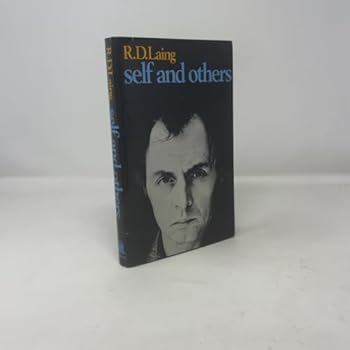Self and Others
Select Format
Select Condition 
Book Overview
Originally published in 1961 this book is divided into two parts. In the first Laing critiques the Kleinian view of unconsciou phantasy, as developed by Susan Sutherland Isaacs. He emphasizes the... This description may be from another edition of this product.
Format:Hardcover
Language:English
ISBN:0394444604
ISBN13:9780394444604
Release Date:January 1970
Publisher:Pantheon Books
Length:256 Pages
Weight:0.88 lbs.
Dimensions:1.6" x 5.5" x 7.9"
Customer Reviews
2 ratings
A Gem
Published by Thriftbooks.com User , 16 years ago
With examples from clinical experience and theory, existential literature, fine art, and children's stories, R. D. Laing illustrates how the pressures of conformity act upon individuals in our society. Each of us is constantly influenced by others as we influence them. Authority figures judge others and create realities for both themselves and those being judged. The book affirms a personal world. It debunks the idea that phantasy can be observed by another as a series of facts. Phantasy, an object relations term intentionally not spelled with an `f,' is the real experience of a subject. A social phantasy is an internalized experience by a group. For example, a dominant group phantasy is that the therapist has the `answers.' We can think of this as `expertise phantasy'. If only the patient could find the answer he would cease to suffer. One person can only infer through language and gesture what the experience of another can be. Laing said elsewhere: I cannot experience your experience. We must tolerate ambiguity and paradox. Laing cites the teachings of Hsi Yun, a Zen Master of about 840 A.D: "That the real difficulty is not so much in his questions being unanswerable as in his continuing in the state of mind that leads him to ask them." Selves for Liang can be either authentic or false. False selves are an adaptation to false realities. Laing explores and illustrates everyday untenable situations, identity, attribution, pretense, elusion, delusion, and collusion. This is well worth reading. I read it first at age 17 and didn't understand it well. Forty years later it makes for better reading. It's a gem.
A very good read
Published by Thriftbooks.com User , 19 years ago
I was pleasantly surprised by this book. It looked so unassuming at the library and so ancient with it's old dust jacket, but this book is another timeless work, by someone I wish I had come into contact with in my early twenties as opposed to now in my thirties. This book shows people in very easy to understand language how Schizophrenia actually happens and how people often use "difference" to equate with wrong or right thinking. He shows how Cartesian Dualism fails to address the real underlying problems at hand in interpersonal relationships. The self defines itself through the eyes of others and can constantly feel the need for justification of importance or merit to the point of irrationality. But also that others can come to associate the irrationality as something wrong or immoral about the person as opposed to a disorder the self is just completely unconscious of. In other words the person comes to believe that they are in and of themselves wrong or right based on their interactions with other people and begin to define themselves opposite to anything they feel is not their self in order to feel right or prove someone elses falsity. This places the individual in a "untenable" position. They are no more an actor upon themselves but constantly re-evaluating everyone around them in order to try to escape this position, what they fail to realize is that no escape is possible and that life can present unanswerable conditions. Often the person going through this experience will feel as though they are unable to decide what is right or wrong for themselves. This leads to a sort of paranoia of the sort that nobody likes them or that nobody thinks about them and they project the image that they could care less about what anyone else thinks about them. There seems to be a sort of thrashing about and rehashing of thoughts with an inability to relate to others and alienation sets in. The book uses many literature examples of untenable positions as well as psychiatric situations and recordings to illustrate the process of the mind of someone dealing with schizophrenia and the inability of the disorder to exist outside of a relation to others. I still liked Politics of Experience more but this book is highly recommended as well.






